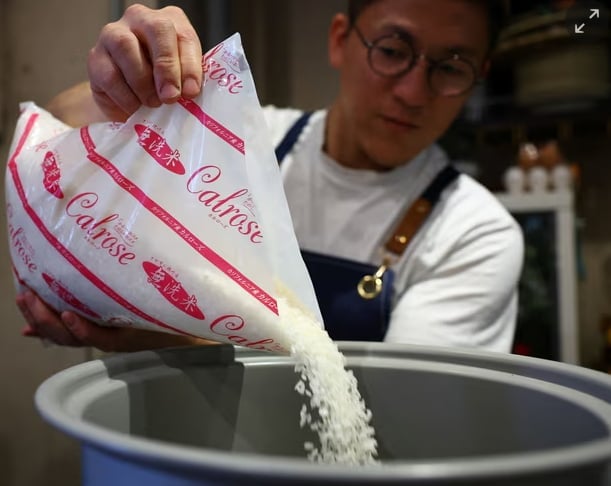December 5, 2025 | 22:55 GMT +7
December 5, 2025 | 22:55 GMT +7
Hotline: 0913.378.918
December 5, 2025 | 22:55 GMT +7
Hotline: 0913.378.918

Consumers in Japan blame the government for failing to rein in the cost of rice. Photograph: Kim Kyung-Hoon/Reuters.
Japan’s government is battling record-low approval ratings as consumers voice anger at soaring rice prices just weeks before key national elections.
Attempts to bring down the price of the Japanese staple have had little effect, prompting calls for a reduction in the consumption (sales) tax to ease the cost-of-living crisis.
A new poll by the Kyodo news agency found that consumers blamed the administration of the prime minister, Shigeru Ishiba, for rising pressure on household finances.
Approval ratings for Ishiba’s cabinet stand at 27.4%, according to the poll, the lowest since he took office last October and a dip of more than five percentage points in the past month, Kyodo said.
Ishiba’s ruling Liberal Democratic party (LDP) has so far ruled out a cut in the 10% consumption tax, which promises to be a focal point of upper house elections in July.
Ishiba is already under pressure after the LDP and its junior coalition partner lost their lower house majority last autumn. Significant losses in the upper house will only add to calls from opponents inside the party for him to go.
Almost three-quarters of respondents said the tax, which is levied on a wide range of goods and services, should be cut “only for food items”, “for all products” or be abolished altogether, the poll found.
More worrying for Ishiba, just over 87% of respondents said government efforts to rein in the price of rice had been “insufficient”, while more than 74% said they did not expect ongoing US-Japan tariff talks – including negotiations on American imports of rice and other foodstuffs – to end favourably to Japan.
Earlier this year Ishiba’s government took the unusual step of dipping into its vast rice reserves. In March it began releasing stockpiled rice in an attempt to arrest price rises that have been blamed on a combination of factors, including higher demand fuelled in part by the tourism boom, distribution bottlenecks, and suspected hoarding by wholesalers and distributors in anticipation of further shortages.
But the move, which is usually reserved for shortages caused by natural disasters and crop failures, did not have the desired effect, with prices of domestic rice falling only marginally.
The price of rice sold in supermarkets averaged ¥4,214 ($29) for 5kg during the week to 4 May, according to the agriculture ministry. That is ¥18 cheaper than the all-time high recorded a week earlier, but still around double the price at the same time last year.
In response, the government said last week it would double the supply of stockpiled rice, with an additional 300,000 tons due for release in the three months to July, media reports said. That is on top of 300,000 tons that has already been released from emergency stockpiles since March. In addition, some of the rice will bypass wholesalers so it can reach shops more quickly.
The mounting rice crisis has forced more Japanese restaurants and consumers to turn to cheaper imports. In April, Japan imported South Korean rice for the first time in a quarter of a century.
Last week, the supermarket chain Aeon said it would start selling US-produced Calrose rice from early next month. A 4kg bag will cost about 10% less than Japanese rice.
The Guardian

(VAN) Landmark SOLAW 2025 report reminds us that resources for food are not infinite.

(VAN) Climate change is a growing concern for agricultural productivity and several studies have focused on how climate variations can impact crop yields.

(VAN) In today's fast-paced society, with people busy with their work and social lives, many dream about quitting the rat race to experience a slower pace of life, which they imagine as being more poetic.

(VAN) Mindanao’s durian industry is reaping the benefits of rising global demand, with farmers now enjoying improved market access, better farmgate prices, and stronger profitability, the Department of Agriculture in Davao Region (DA-11) reported.

(VAN) Iraq is currently grappling with one of the most severe agricultural and livestock crises in its modern history.

(VAN) The Mediterranean and the Black Sea: Fisheries sustainability concerns remain, but overfishing drops to its lowest level in a decade, while aquaculture feeds more people.

(VAN) Cargill Inc has no plans to close its U.S. beef processing plants, days after meatpacker Tyson Foods l opens new tab announced it would shutter a Nebraska facility as industry grapples with cattle supplies.